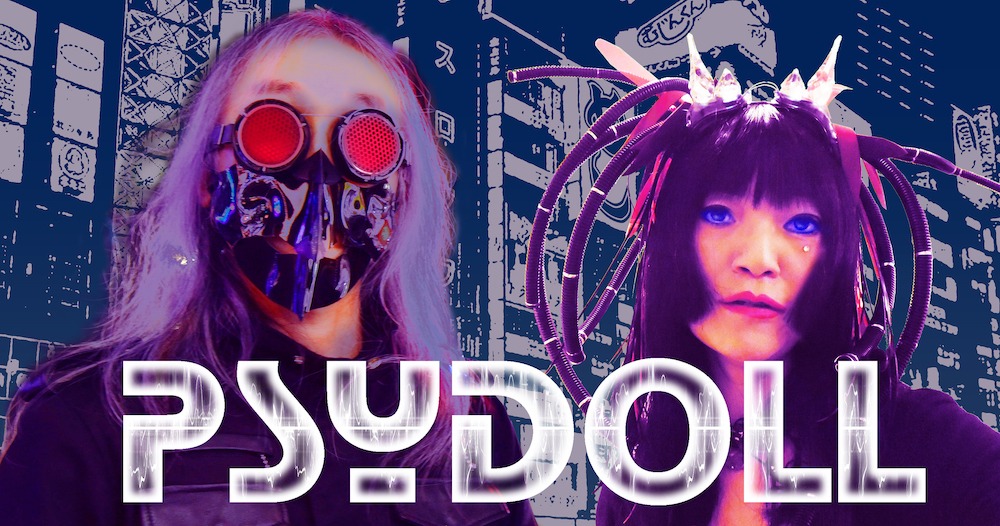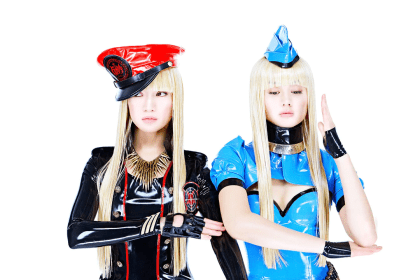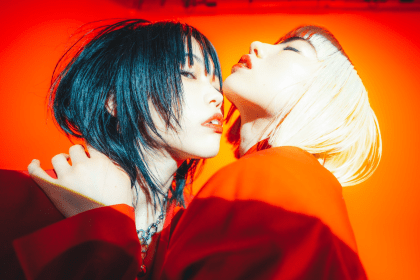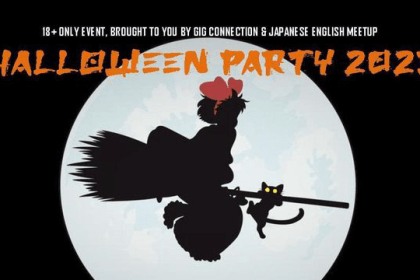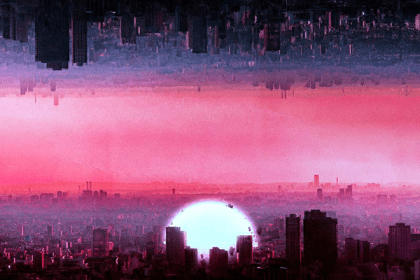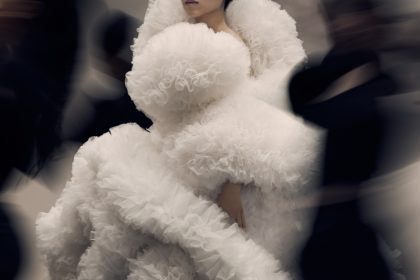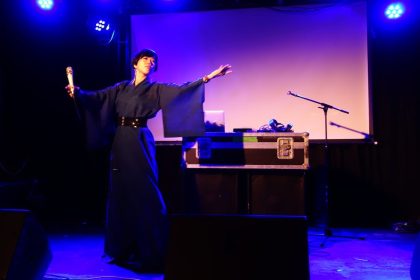Cyber Pop Go
Music seems to love a neat, orderly system of genres for artists and bands to be filed in. Occasionally, however, some bands turn up that prove difficult to nail down to any one niche. Tokyo’s Psydoll are an example of one of those bands, with a musical oeuvre that darts between cyberpunk, rock, electronic and industrial.
The Japanese outfit have been in action since the 1990s, initially through the select release of a few mini-albums. Currently consisting of Nekoi (vocal,keyboard,songs) and Ucchi (guitar,arrangements,computer works), Psydoll offer themselves as a band that make “destructive, sweet sounds” and have been described as “J-Pop for the Nine Inch Nails generation.”
Psydoll draw a lot from pop culture, leaning heavily on cyberpunk, anime and manga to inspire their visual ideas and concepts. In their world, Japanese companies usually use the word “DOLL” to name their production robots for military, business and home use. Psydoll (Psycho-Doll) are illegal robots manufactured without proper licenses and with enhanced abilities unlike officially sanctioned “DOLLs”.
Not surprisingly, Psydoll refer to the likes of Ghost In The Shell as influences, as well as the likes of Blade Runner and The Matrix. Meanwhile, for those versed in the minor arcana of the tarot deck, the titles of Psydoll’s Machine Kingdom EPs refer to the suits of the wand, the sword, the cup and the disk (also referred to as coins or pentacles). The wand is associated with the element of fire and also with creativity. The sword, along with its military aspects, is associated with air and also the application of reason. The disk is the element of earth and material goods. Finally, the cup is associated with water and refers to emotions and love.
Psydoll’s reference to dolls and robots is something that’s a common element of Japanese artists, with the likes of FEMM and Die Milch coming to mind. Musically, however, the band pull from a broad range of influences. They cite the likes of YMO, Siouxsie & the Banshees, King Crimson, Toyah and PIL in particular. The result is a curious hybrid of different genres that seamlessly fit together.
The band are happy to drop in heavy guitar riffs one moment and electropop melodies the next. Meanwhile, Nekoi’s clipped vocals dart in and out as needed. That fractured pop rock approach is something that bands such as Polysics and Broken Doll dabble in, but although there are moments when Psydoll call to mind the new wave pop of Polysics, their style aims for a much heavier direction. At times they recall the darker end of the underground idol scene, such as Necronomidol (Interestingly, Psydoll and the occult idol outfit have also utilised the design skills of manga artist Senno Knife for sleeve artwork).
In a live setting, Nekoi stands out with her striking visual style and the casual way she waves her keytar around on stage. Ucchi, meanwhile, opts for a more mysterious look, often hidden behind a mask. But there’s an energy at work there which brings Psydoll’s songs to life and suggests that the band are performers as well as songwriters.
Psydoll’s most recent releases have consisted of a series of EPs. Gathered under the umbrella title of Machine Kingdom, the four releases are subtitled as chapters in an over-arching story of sorts. The first EP, released in 2015, was titled Machine Sword. Psydoll refer to the title as being reflective of “conflicts, incidents and tragedies”. There are also references to the 2011 earthquake/tsunami which struck Japan’s easter seaboard and resulted in the Fukushima nuclear accident.
There’s a military aspect to Machine Sword’s opening track ‘Omen’ with its tattoo drum beat. Meanwhile, Nekoi’s sober vocals cast a sinister aspect on the composition.
‘Wind’ opens up with a reedy synth riff that’s gradually built up with other elements, including quick fire percussion and guitars. As a result, it’s a prime example of the way Psydoll compose songs; a gradual layering of electronics, guitars and vocals.

On the likes of ‘Flowers’, the heavy use of guitars adopts a more prominent role against the synth lines. Meanwhile, Nekoi’s wistful vocal melodies bring the whole arrangement together. It’s a tune that bounces between an electronic take on the Love Theme from The Godfather to a raw discordant guitar workout.
This first EP closes with ‘Theme Of Psydoll 4’, a busy number with some insistent percussion and chiptune elements.
2016’s Machine Wand, the second EP in the series, opens with the industrial opera of ‘Dawn’. Here, sampled vocal effects battle it out with musique concrète elements to present a busy collage of sounds. Meanwhile, Nekoi’s vocals strike some fetching melodic touches which works as a neat counterpoint to the layered foundation beneath.
Beefier tracks such as ‘Hero’ and ‘Island’ waste little time in establishing their heavy rock credentials, albeit with some neat electronic flourishes. “Who will open the right door for me?” Asks Nekoi on ‘Hero’, as she hunts the titular character.
‘Saturday’, meanwhile, opts for a pop rock direction in which Nekoi ponders her weekend activities (“Where is my Saturday night?”). It’s a more accessible side of Psydoll whose lyrical content confirms that “Everything going to be all right”.
These EP moments offer a good grounding for Psydoll’s approach to music and weaves in the band’s aesthetic – something which Nekoi once summed up in her inimitable way in an interview “I am a black sheep, but I have voice and keyboard to play” (which Ucchi countered with “I’m not in flock. I won’t sell out. I just believe in our sound”).
Machine Disk saw Psydoll’s third EP adventure carry on in a similar fashion. ‘Carnival’ is a fast-moving layered composition with shimmering guitar elements measured against treated vocals from Nekoi. Some neat keyboard riffs give it a classic prog rock feel at times, while the hymnal aspects of the track’s final third offer up some rock opera touches.
BUY NOW
That rock guitar element is front and centre on ‘Hospital’, a miasma of fractured sound against which Nekoi’s words navigate a delicate path.
At times, Psydoll retrieve songs from their back catalogue to give them a new lease of life. ‘Jumon’ for instance, with its middle-eastern rhythms, originally appears on the band’s 2002 album A War In The Box. Elsewhere, the bassy reverie of ‘Coppelia’ has its roots in Psydoll’s 1998 mini-album release Psyber Doll.
Intriguingly, the sleeve artwork from Senno Knife has a consistent theme of manga characters that take on a tarot aspect in their poses. The result is a strong visual image that permeates across all four sleeves.
Things come right up to date on 2018’s Machine Cup, which forms Chapter 4 of the Machine Kingdom saga. ‘Army Alone’, which opens the EP, has a dark, unsettling quality to it. Conversely, ‘Little Ugly Mouse’ has a more intimate approach with Nekoi’s nursery rhyme vocals taking on a more prominent position in the mix. It’s a strange composition which darts around between these softer touches and a harder-edged guitar-fuelled approach, but retains a particular charm in its delivery.
There’s a driving electronic rhythm underlying ‘Hector’ (inspired by the villain in obscure science fiction film Saturn 3), which offers up a pretty solid rock outing. It’s one of Psydoll’s best moments from the Machine Kingdom EPs, batting between guitar riffs and Nekoi’s clipped vocal delivery. Building up from several layers, the subtle use of vocal effects and samples helps give the track a surprisingly polished finish.
Closing proceedings, ‘Paradise’ delivers a classic guitar riff opening although the track as a whole is actually a more sedate outing which offers a more breezy side of Psydoll.
Currently, the Japanese music scene is enjoying a renaissance of sorts for rock-orientated acts, which have also managed to find a western audience. It’s something that newer acts such as Band-Maid and Lovebites have delivered with style, but there’s also a strong interest in the underground idol movement where genres of pop and rock often get blurred. The result is outfits such as the aforementioned Necronomidol or You’ll Melt More!, all offering a quirky, engaging mix of styles.
Psydoll, meanwhile, appear to occupy their own particular niche. The band continue to deliver a blistering combination of electronics and guitars that’s managed to strike a chord with people for over two decades. It’s probably the best time for Psydoll to enjoy their own renaissance in a climate that’s becoming ever more receptive to Japan’s diverse musical acts.
Machine Cup: Chapter 4 of Machine Kingdom is out now.
Psydoll have UK live dates scheduled throughout February and March. Details on the J-Pop Go Events Calendar.
http://www.psydoll.com
https://www.facebook.com/Psyber.Psydoll/
https://twitter.com/PSYDOLL

